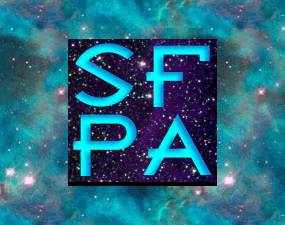I’ve often thought that academia is another form of fandom–intense devotion to a particular set of texts, a circle of intensely intellectual people that meets regularly to analyze them–but in a recent conversation it really struck me. I forget the genesis of it, but a friend of a friend concluded dismissively, “Well then, [this project] will only matter to ten people.” I shot back, “But to those ten people, it will matter immensely!”
To outsiders, both fandom and academia are opaque–it’s lots of work for little material gain. I’ve published a number of articles and typically only get paid in copies of the publications themselves; I’ve written even more for fan sites (fiction, reviews, critiques) and not only not been paid, but have actually paid myself to contribute to fees for server space and such. In mundane life, this strikes people as rather a backward process–and yet, if one explains that what one does is purely for love–well, that just seems to blow people’s minds. And I find that rather sad.
 So, the study of fantasy. As an area of academic inquiry, it is rather messily aligned (largely by default) with the study of science fiction, though unfortunately SFS journals tend to seemingly avoid it as much as possible. As discussed previously, many contemporary readers and writers start the modern genealogy of fantasy with Tolkien–though obviously the genre goes back much further than that. However, that familiar narrative of a diverse band on a quest is at this point inextricably bound up with our cultural expectations of “how the story goes,” and so we find that material that doesn’t fit these conventions tends to get sidelined–and that’s true of academia as well, sadly.
So, the study of fantasy. As an area of academic inquiry, it is rather messily aligned (largely by default) with the study of science fiction, though unfortunately SFS journals tend to seemingly avoid it as much as possible. As discussed previously, many contemporary readers and writers start the modern genealogy of fantasy with Tolkien–though obviously the genre goes back much further than that. However, that familiar narrative of a diverse band on a quest is at this point inextricably bound up with our cultural expectations of “how the story goes,” and so we find that material that doesn’t fit these conventions tends to get sidelined–and that’s true of academia as well, sadly.
 Thus, you have several publications devoted to the study of Tolkien’s work (such as Mythlore), you have irregular publications on Howard and Burroughs, and then there’s the Journal for the Fantastic in the Arts which is a bit of a catch-all for everything else. The International Association of the Fantastic in the Arts publishes JFA and manages the International Conference on the Fantastic in the Arts, held each year in Orlando; their thirty-fifth meeting will be next March. I’ve gone to ICFA only once–it’s a mid-size conference and very welcoming to new scholars of genre, though in its determination to maintain a cohesive area of interest it has rather pushed out related areas such as fan studies–but that’s a topic for another day. The National Meeting of the Popular Culture Association, one of the larger academic conferences and also held yearly, combines Science Fiction and Fantasy into a single programming track, though there are multiple other areas such as Vampire Literature at the same meeting.
Thus, you have several publications devoted to the study of Tolkien’s work (such as Mythlore), you have irregular publications on Howard and Burroughs, and then there’s the Journal for the Fantastic in the Arts which is a bit of a catch-all for everything else. The International Association of the Fantastic in the Arts publishes JFA and manages the International Conference on the Fantastic in the Arts, held each year in Orlando; their thirty-fifth meeting will be next March. I’ve gone to ICFA only once–it’s a mid-size conference and very welcoming to new scholars of genre, though in its determination to maintain a cohesive area of interest it has rather pushed out related areas such as fan studies–but that’s a topic for another day. The National Meeting of the Popular Culture Association, one of the larger academic conferences and also held yearly, combines Science Fiction and Fantasy into a single programming track, though there are multiple other areas such as Vampire Literature at the same meeting.
Next time, I’m going to continue this line of discussion, and try to explain a bit more of the scholarly investigations that are ongoing in Fantasy studies, and how you can get involved if you like. *G*
Cait Coker is the Curator for the Science Fiction and Fantasy Research Collection and Coordinator of Research Services for Cushing Memorial Library & Archives. An Associate Professor at Texas A&M, her research interests focus on the depiction of women, gender, and sexuality in science fiction and fantasy.










Yes, there’s nothing like scholasticism except more scholasticism; they say it’s a source, if it can but be tapped. I think science fiction was crying out for it when colleges started presenting science fiction courses. It’s a good way to go, but time-consuming and someone who goes for the academic approach to sf might never return. So anything that lets people in on what’s been evolved in terms of academic thought and summarizes it would be a good thing for those who do not find academia to be their place in life.